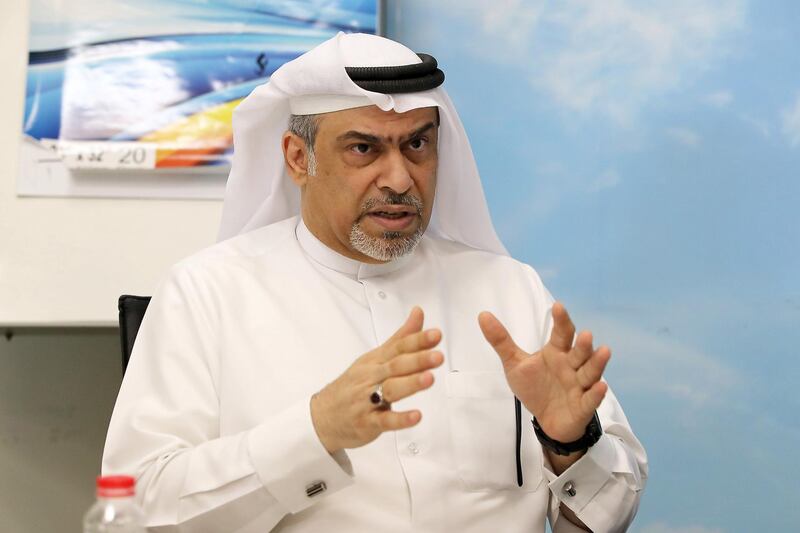Children as young as 12 are at risk of becoming drug addicts and need a place to turn to for specialised treatment.
Dr Hussain Maseeh, a social care expert at Dubai's Community Development Authority, said the Ownak Social Rehabilitation Centre helped treat 217 patients, the majority of whom were between 18 and 27, since it opened in 2013.
The centre provides aftercare services to recovering male Emirati drug addicts through voluntary referrals.
"We are mainly seeing young adults in their twenties coming through our doors at Ownak," Dr Maseeh told The National.
With addiction often taking years to set in, he said many of the patients treated at Ownak began using drugs in their teens.
"That is why we need a centre offering prevention programmes exclusively for 12- to 18-year-olds, to help treat them before addiction sets in," Dr Maseeh said.
The centre, however, does not directly treat under those under 18. Instead, it works "hand-in-hand with the CDA's child protection services" to help treat children and teens who show signs of drug abuse or use.
The "addition of safe havens" that offer at-risk teens the right medical and emotional support could help curb the rise of drug addiction in the UAE and globally, Dr Maseeh said.
Rapid globalisation has led to the expansion and diversification of the drugs market, making narcotics more readily available worldwide.
“What we are noticing globally is that the age when people start to take drugs is getting lower,” he said.
“Before, teens would start experimenting at the age of 14 or 15, but now kids as young as 12 are [taking drugs].”
The digital era has had a big effect on the accessibility of drugs too, with many substances now “readily available at parties and social gatherings”.
This, coupled with a nonchalant attitude towards experimentation, means teens are more exposed than ever before, Dr Maseeh said.
According to the United Nations World Drug Report 2019, non-medical use of prescription drugs is becoming a major threat in parts of the world.
It noted tramadol as one of the main pills being widely trafficked for non-medical use.
"[Tramadol] is becoming a major threat in West, Central and North Africa, from where some of it is trafficked onwards to countries in the near and Middle East," the report said.
Locally, Dr Maseeh said, the majority of patients treated through Ownak's addiction aftercare programme also self-medicated.
"When we talk about prevalence of drugs being used, prescription medicine definitely tops the list … it's because [it is] easy to access."
Morphine, marijuana and hashish follow close behind.
Dr Maseeh said the main drivers of drug addiction in the UAE are peer pressure, family issues and increased access to substances – a sentiment echoed by Col Abdulla Al Khayat, manager of the Hemaya International Centre, during a conference held in April in Dubai to combat drug use.
"Most problems start when people are teenagers.
“Parents believe their children are so innocent and they don’t have to talk to them about drugs, but this is not right because our kids know a lot from social media and from the people around them,” Col Al Khayat said at the time.
In 2017, the UN estimated that 5.5 per cent (271 million people) of the global population between the ages of 15 and 64 had used drugs in the previous year, while 35 million people were suffering from drug-use disorders.
About 585,000 deaths were recorded as a result of drug abuse, the report said.
“For people with drug-use disorders, the availability of and access to treatment services remains limited at the global level, as only one in seven people with drug-use disorders receive treatment each year,” it stated.
In the UAE, drug rehabilitation services are available for men and women through the National Rehabilitation Centre in Abu Dhabi, the Erada Centre for Treatment and Rehabilitation in Dubai and a number of other private facilities.
The majority of cases involve men.
“Different sectors of the community need their own dedicated drug treatment and rehabilitation centres,” Dr Maseeh said.
"It's not just males that need to be treated, women do too. At CDA we are looking to establish dedicated programmes for women and teens in the future, but the challenge is the low numbers that present [themselves] to us with issues."
With a "few cases of female drug addiction" at the CDA, Dr Maseeh said the lack of voluntary referrals from women and teens could be down to a lack of awareness of services, fear of the law and even cultural sensitivities.
“When demand increases, so too will the service options.
“While efforts have been stepped up to treat addiction and abuse, for some it’s still a taboo, but we need to work on awareness.
“People need to know that help is at hand, they just need to make the first step and ask.”
In the UAE, drug abusers can approach an rehabilitation centre or prosecutors and ask for help, without the fear of them facing criminal charges.






